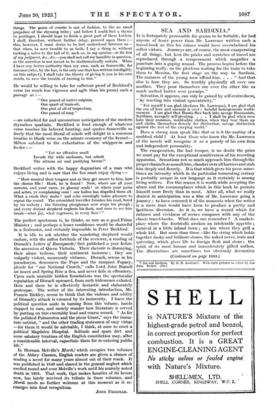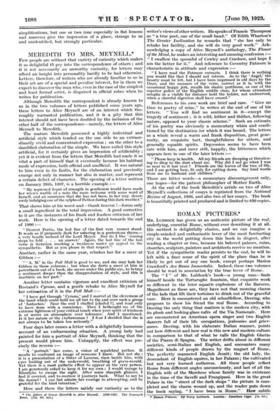SEA AND SARDINIA.*
IT is fortunately permissible for genius to be Irritable, for had anyone of lesser power than Mr. Lawrence written such a travel-book as this his crimes would have overwhelmed his
softer virtues. Journeys are, of course, the most exasperating of all things, but here the pricks and scratches of travel are
reproduced through a temperament which magnifies a puncture into a gaping wound. The process begins before the
beginning really, on the platform waiting for the train to take them to Messina, the first stage on the way to Sardinia. The manners of the young men offend him. . . . " And that also is how they are. So terribly physically all over one another. They pour themselves one over the other like so much melted butter over parsnips."
Salvation, it appears, can only be gained by self-centredness, " by reacting into violent egocentricity."
" For myself I am glad (declares Mr. Lawrence), I am glad that the era of love and oneness is over : hateful homogeneous world- oneness. I am glad that Russia flies back into savage Russianism,
Scythism, savagely self-pivoting. . . I shall be glad when men hate their common, world-alike clothes, when they tear them up and clothe themselves fiercely for distinction, savage distinction against the rest of the creeping world."
Does a strong man speak like that or is it the mutiny of a snubbed child ? At least those who know the Mr. Lawrence of the novels will recognize it as a parody of his own firm and independent personality.
The exasperation, the bad temper, is no doubt the price we must pay for the exceptional sensitiveness of his recording apparatus. Sensations not so much approach him through the proper channels as assault him, clamber over all barriers and stab him deeply and fiercely. It is that which gives his prose some- times an intensity which in its particular tormenting ecstasy is probably unique in our language as it certainly is among living writers. For this reason it is worth while accepting the abuse and the commonplaces which in this book he permits
himself more freely than in most. After all, what we really desired in anticipation was a film of Mr. Lawrence going a journey ; to have censored it of the moments when the writer is a mere man would have been to produce a pretty and factitious diversion. As it is, we have a record which for richness and vividness of scenes compares with any of the classic travel-books. What does one remember ? A market-
place where the foodstuffs awaken an intolerable appetite ; carnival in a little inland town ; an inn where they grill a whole kid. But more than these—like the string which holds together dusky and brilliant stones, the naked nerve, irate and quivering, which gives life to foreign flesh and stone : the spirit of its most human and immoderately gifted author.
The illustrations are sometimes too obviously decorative (Continued on page 1088.) • Sea and Sardinia. By D. H. Lawrence. With eight pictures In colour by. Jan Juts. Becker. [218.1
simplifications, but one or two (one especially in flat lemons and mauves) give the impression of a place, strange to us and unidentified, but strongly particular.











































 Previous page
Previous page